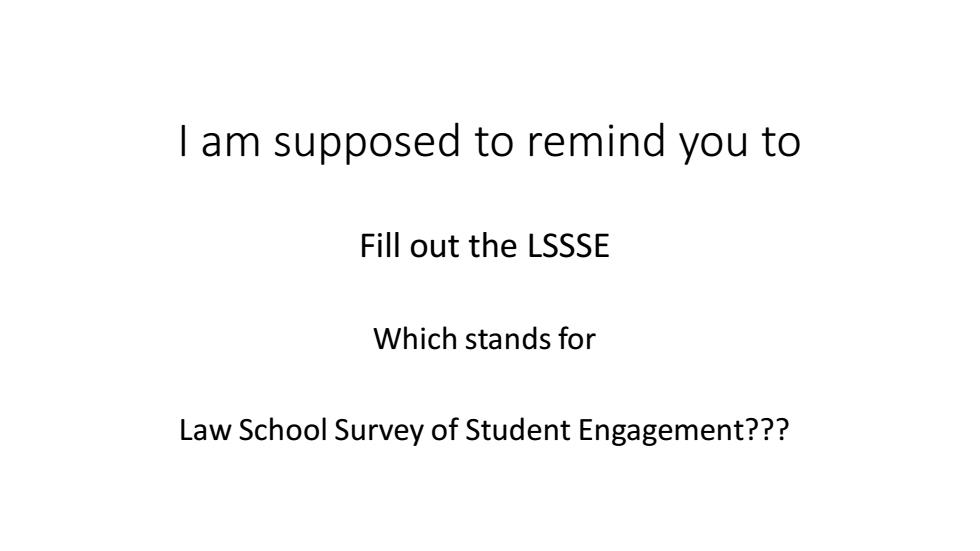
I am supposed to remind you to Fill out the LSSSE Which stands for Law School Survey of Student Engagement???
I am supposed to remind you to Fill out the LSSSE Which stands for Law School Survey of Student Engagement???
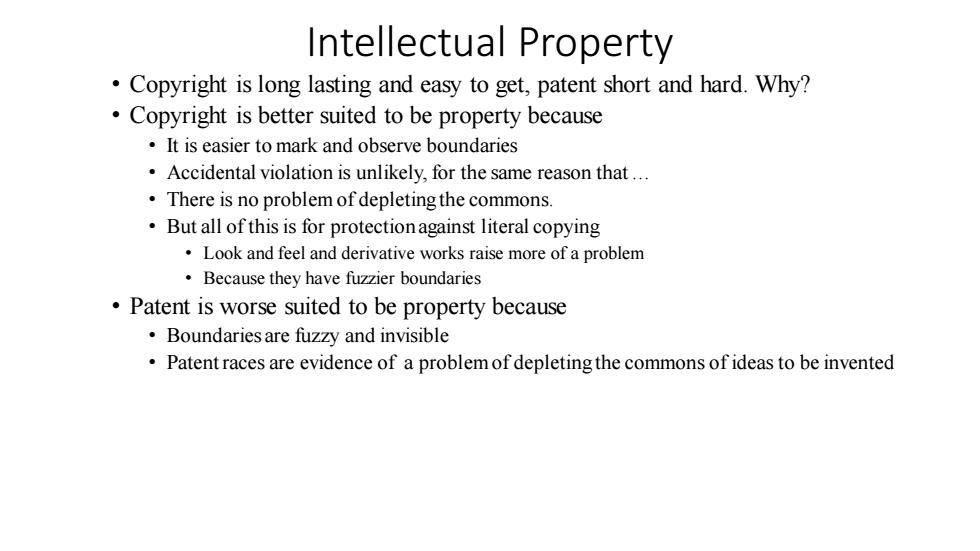
Intellectual Property Copyright is long lasting and easy to get,patent short and hard.Why? Copyright is better suited to be property because It is easier to mark and observe boundaries Accidental violation is unlikely,for the same reason that... There is no problem of depleting the commons. But all of this is for protectionagainst literal copying Look and feel and derivative works raise more of a problem Because they have fuzzier boundaries Patent is worse suited to be property because Boundaries are fuzzy and invisible Patent races are evidence of a problem of depleting the commons of ideas to be invented
Intellectual Property • Copyright is long lasting and easy to get, patent short and hard. Why? • Copyright is better suited to be property because • It is easier to mark and observe boundaries • Accidental violation is unlikely, for the same reason that … • There is no problem of depleting the commons. • But all of this is for protection against literal copying • Look and feel and derivative works raise more of a problem • Because they have fuzzier boundaries • Patent is worse suited to be property because • Boundaries are fuzzy and invisible • Patent races are evidence of a problem of depleting the commons of ideas to be invented
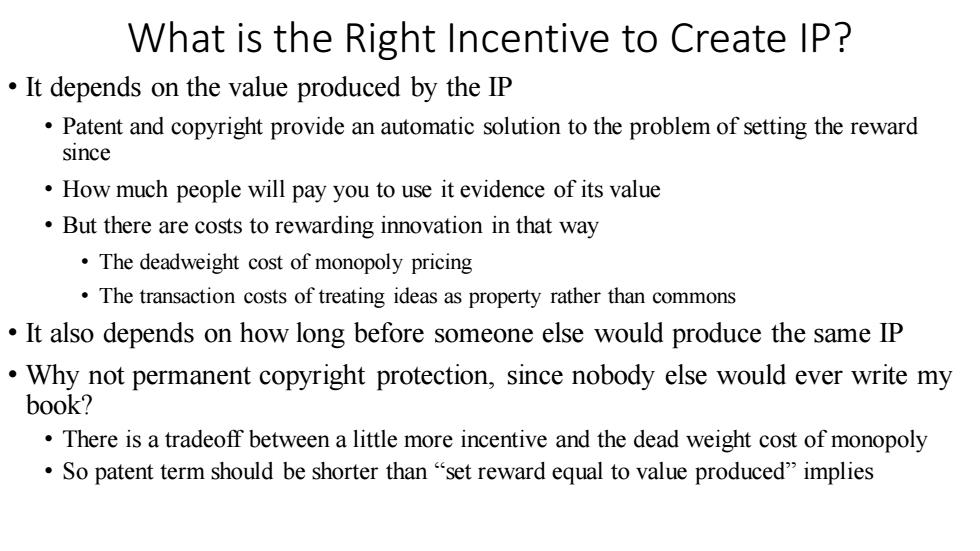
What is the Right Incentive to Create IP? It depends on the value produced by the IP Patent and copyright provide an automatic solution to the problem of setting the reward since How much people will pay you to use it evidence of its value But there are costs to rewarding innovation in that way The deadweight cost of monopoly pricing The transaction costs of treating ideas as property rather than commons It also depends on how long before someone else would produce the same IP Why not permanent copyright protection,since nobody else would ever write my book? There is a tradeoff between a little more incentive and the dead weight cost of monopoly So patent term should be shorter than"set reward equal to value produced"implies
What is the Right Incentive to Create IP? • It depends on the value produced by the IP • Patent and copyright provide an automatic solution to the problem of setting the reward since • How much people will pay you to use it evidence of its value • But there are costs to rewarding innovation in that way • The deadweight cost of monopoly pricing • The transaction costs of treating ideas as property rather than commons • It also depends on how long before someone else would produce the same IP • Why not permanent copyright protection, since nobody else would ever write my book? • There is a tradeoff between a little more incentive and the dead weight cost of monopoly • So patent term should be shorter than “set reward equal to value produced” implies
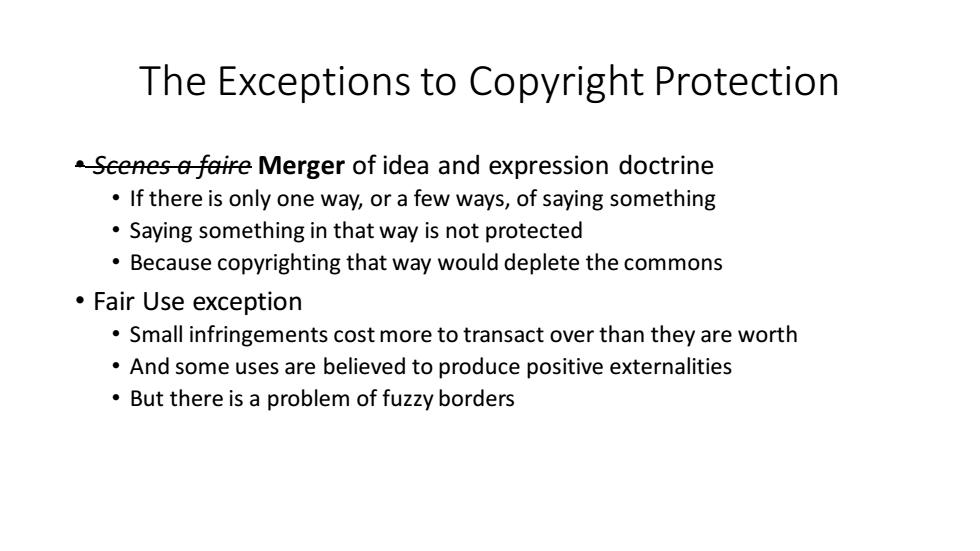
The Exceptions to Copyright Protection .Scenes a faire Merger of idea and expression doctrine If there is only one way,or a few ways,of saying something Saying something in that way is not protected Because copyrighting that way would deplete the commons ·Fair Use exception Small infringements cost more to transact over than they are worth And some uses are believed to produce positive externalities But there is a problem of fuzzy borders
The Exceptions to Copyright Protection • Scenes a faire Merger of idea and expression doctrine • If there is only one way, or a few ways, of saying something • Saying something in that way is not protected • Because copyrighting that way would deplete the commons • Fair Use exception • Small infringements cost more to transact over than they are worth • And some uses are believed to produce positive externalities • But there is a problem of fuzzy borders
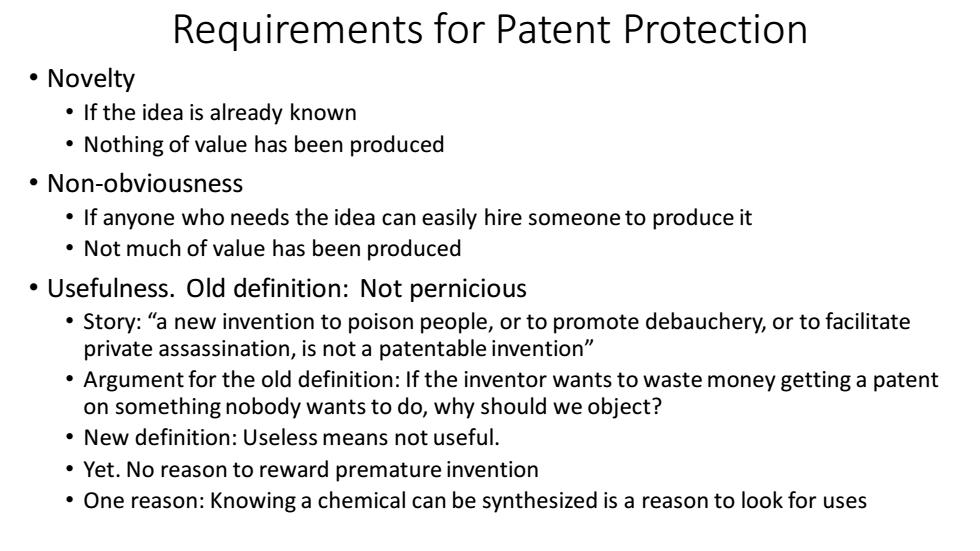
Requirements for Patent Protection ·Novelty If the idea is already known Nothing of value has been produced 。Non-obviousness If anyone who needs the idea can easily hire someone to produce it Not much of value has been produced Usefulness.Old definition:Not pernicious Story:"a new invention to poison people,or to promote debauchery,or to facilitate private assassination,is not a patentable invention" Argument for the old definition:If the inventor wants to waste money getting a patent on something nobody wants to do,why should we object? New definition:Useless means not useful. Yet.No reason to reward premature invention One reason:Knowing a chemical can be synthesized is a reason to look for uses
Requirements for Patent Protection • Novelty • If the idea is already known • Nothing of value has been produced • Non-obviousness • If anyone who needs the idea can easily hire someone to produce it • Not much of value has been produced • Usefulness. Old definition: Not pernicious • Story: “a new invention to poison people, or to promote debauchery, or to facilitate private assassination, is not a patentable invention” • Argument for the old definition: If the inventor wants to waste money getting a patent on something nobody wants to do, why should we object? • New definition: Useless means not useful. • Yet. No reason to reward premature invention • One reason: Knowing a chemical can be synthesized is a reason to look for uses